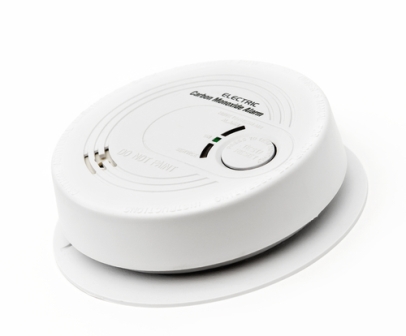You may already know you need fire detectors in your home, but do you know you should also have carbon monoxide (CO) detectors, as well as knowing where to place them? CO is a colorless, tasteless and odorless gas that can be lethal if inhaled for long enough or in sufficient quantities. Every year about 400 people in the U.S. die from accidental carbon monoxide poisoning, according to the federal Centers for Disease Control and Prevention (CDC).
Combustion furnaces, wood stoves, fireplaces, gas water heaters, gas stoves, some space heaters and any other device that burns fuel may emit trace amounts of carbon monoxide, but the main danger is malfunctioning equipment. Th is is why it’s so important to make sure your furnace, gas water heater and other combustion appliances are properly installed and well-maintained. Cars also emit carbon monoxide, which is why you should only run a car outside and not in a garage any longer than it takes to back it out into the driveway.
is is why it’s so important to make sure your furnace, gas water heater and other combustion appliances are properly installed and well-maintained. Cars also emit carbon monoxide, which is why you should only run a car outside and not in a garage any longer than it takes to back it out into the driveway.
Symptoms of CO poisoning include headaches, nausea, fatigue and difficulty breathing. Even low levels of poisoning over time can make you sick.
The best way to protect yourself and your family is with CO detectors. Faulty appliances may improperly vent, and without CO detectors, you have no way of knowing you’re being poisoned. Install CO detectors in the hallway outside of your bedrooms, in stairwells and the basement. The International Association of Fire Chiefs recommends CO detectors on every floor of your house.
Carbon monoxide detectors are not smoke alarms, and vice versa. You need both. It’s important to install them at least 15 feet away from combustion appliances that may emit trace amounts of CO, and away from bathrooms and heater vents. Plug-in detectors should have battery backups, and battery-operated ones need fresh batteries to operate at peak performance. Change batteries twice a year and check that your CO detectors aren’t covered up by curtains or furniture.
If you’d like to know more about CO detectors and where to locate them, please contact Hansberger Refrigeration and Electric Company for our expert advice. We’ve been servicing the Yuma area since 1952.
Our goal is to help educate our customers in Yuma, Arizona about energy and home comfort issues (specific to HVAC systems). For more information about CO detectors and other HVAC topics, download our free Home Comfort Resource guide.
Image courtesy of Shutterstock